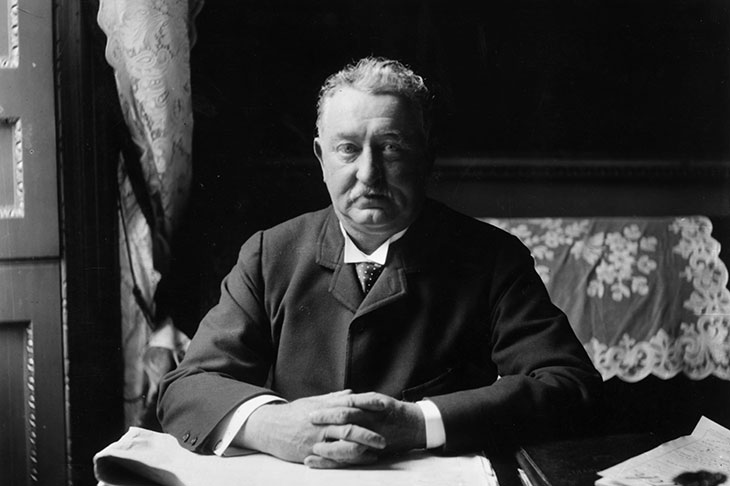Activists wish to change the name of a school in north London because it is named after a road which was named after a dairy farmer who had the same name as someone the activists dislike. This is the Rhodes Avenue primary school in Wood Green, named after Thomas Rhodes, a great-uncle of Cecil Rhodes who died when Cecil was three. According to the activists, Thomas cannot be ‘disentangled’ from Cecil despite the fact that they are totally different people separated by two generations.
These genii would like the school to be renamed Oliver Tambo school, after the popular South African murderer and politician. It would not hugely surprise me if they got their way, seeing as the Labour leader of the council, a halfwit called Joseph Ejiofor,has said that schools shouldn’t be named after the relatives of ‘white supremacists’. Perhaps we should also cease calling roads roads because of the phonetic distress occasioned to too many activists.
The confected outrage possessing these truly stupid people devolves from the equally stupid Black Lives Matter protests, before which, once again, our spineless and woke institutions collectively cringed. It does not matter that virtually every complaint made by BLM activists is demonstrably fallacious. It does not matter that white American police officers are no more likely to kill black suspects than officers of non-white heritage (as shown last year in a study by the University of Michigan and the University of Maryland); or that the people most likely to murder black people are, by a huge margin, other black people. None of these realities — truths — which tend to disprove the BLM thesis prevent the activists from wallowing in specious victimhood or succeed in convincing virtue-signalling institutions that they are paying obeisance to an easily refutable series of lies. Down on one knee they go.
The truth has no purchase, because we are living in a post-truth society. For example, in the transgenderism debate, science and therefore reality doesn’t matter. It doesn’t matter to the activists, of course, but that’s to be expected. But it also doesn’t matter to the government, or to our institutions. The reality doesn’t matter; it’s all about how people feel, and in our desire not to give offence we succumb to idiocy or doublethink.
When a history professor suggests that not absolutely everything that came out of colonialism was bad, his colleagues denounce him and start writing letters and signing petitions, despite the patent fact that what the professor suggested was true — even if it was just the building of a bridge or a railway line. Our Prime Minister is denounced as a white supremacist for suggesting that Africa’s problems are not the consequence of colonialism but instead the result of appalling post-colonial leadership. Again, this is something that is very easy to argue, simply by looking at a few case studies for comparison, such as Ethiopia and Liberia (never colonised) vs, say, Singapore and Malaysia (colonised for 200 years and not doing too badly). The facts don’t matter, only the attitude matters — and in stating the facts, one is displaying a white supremacist attitude. The greater the truth, the more offence it is likely to cause and so the more vigorously it will be resisted.
One conclusion to be drawn is that the nation is gripped by a kind of derangement, and that this may have been occasioned by our suffering under a government that is behaving with all the coherence of a rigorously trepanned village idiot. Increasingly, nothing the government does makes any sense, which is why they change tack within 24 hours and immediately do the complete reverse of what they were doing before.
There is a certain beautiful madness in an administration which, at one and the same time, announces its important nanny strategy to tackle our terrible obesity epidemic while the Chancellor subsidises everybody to half-price meals at Burger King, KFC and McDonald’s. Does this seem to you an example of nicely joined-up thinking? As it happens, I disagree with both prongs of this delightfully self-contradictory approach. I find the doling out of taxpayers’ money to extraordinarily wealthy multinational companies, simply so other taxpayers can stuff their fat faces more cheaply, an absurdity and something close to an outrage. But luckily this has been balanced by preventing those same companies from providing a better deal to customers from their own reserves, by banning buy-one-get-one-free offers. Does this not strike you as bizarre?
In fairness, almost all previous attempts to get us to lose weight have been at the very least supremely irritating, such as telling very rich multinational companies to reduce the sizes of their products, which they cheerfully do while selling them at the same price as before. Or instructing them to put less sugar and salt in their food, so that the stuff tastes awful. I still have a folk memory of what Mars Bars used to taste like before they meddled around with them at the behest of the health campaigners. The dense and sometimes pleasingly gritty nougat, the weight of the bar in one’s hand. All gone. And we’re a lot fatter now we’re eating these bowdlerised confections, so the policy has been singularly unsuccessful.
The government is, in general, at a loss. It does not know if we should be in lockdown or out of lockdown and it changes its stance almost every day. It is losing the goodwill of the public. And we, the public, seem to be losing our minds.
Got something to add? Join the discussion and comment below.
Get 10 issues for just $10
Subscribe to The Spectator Australia today for the next 10 magazine issues, plus full online access, for just $10.
spectator.co.uk/rodliddle - The argument continues online
You might disagree with half of it, but you’ll enjoy reading all of it. Try your first month for free, then just $2 a week for the remainder of your first year.















Comments
Don't miss out
Join the conversation with other Spectator Australia readers. Subscribe to leave a comment.
SUBSCRIBEAlready a subscriber? Log in